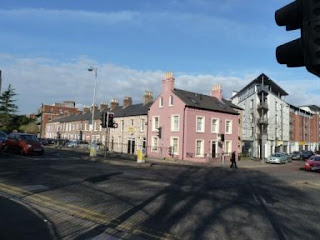 I can vividly remember the summer afternoon when I overheard an exchange between a customer and a member of staff that inspired my ambition to become a bookseller. The customer asked for a copy of Daniel Deronda, but was offered Robinson Crusoe (because it's by Daniel Defoe... ). The confusion was a rare lapse by a member of the University Bookshop's staff, but it was a light-bulb moment for me. I could do this, I thought. I had great difficulty in restraining myself from putting the correct book in the customer's hand. Half-way through my university course, I was unsure what I wanted to do when I graduated. Suddenly I realised that my love of bookshops, and my desire for a career that involved reading and writing could be combined.
I can vividly remember the summer afternoon when I overheard an exchange between a customer and a member of staff that inspired my ambition to become a bookseller. The customer asked for a copy of Daniel Deronda, but was offered Robinson Crusoe (because it's by Daniel Defoe... ). The confusion was a rare lapse by a member of the University Bookshop's staff, but it was a light-bulb moment for me. I could do this, I thought. I had great difficulty in restraining myself from putting the correct book in the customer's hand. Half-way through my university course, I was unsure what I wanted to do when I graduated. Suddenly I realised that my love of bookshops, and my desire for a career that involved reading and writing could be combined.The story of how I found myself behind the counter at Hatchards, Piccadilly, two years later deserves a post to itself, but that moment of epiphany in Belfast was truly life-changing. So I owe the University Bookshop a lot. Returning this spring to spend an extended period in my home city for the first time since 1978, I was relieved to find the shop relatively unchanged, still stocking such a quantity of Irish fiction, history, poetry, biography and politics that on my first two-hour visit I didn't even get to the history and politics shelves, let alone beyond the Irish interest section. So it was a bitter blow to discover that my happy browsing and purchasing were about to be terminated.
The cirumstances of the closure have been reported in The Bookseller
http://www.thebookseller.com/news/belfast-university-bookshop-close.html
and its consequences thoroughly explored in a blog by Jenny Muir, a lecturer at Queen's, who also suggests an attractive model for the shop's possible future
http://eastbelfastdiary.blogspot.com/2011/06/do-we-need-to-lose-bookshop-at-queens.html
In a BBC interview, poet Michael Longley described it as 'the centre of cultural life at Queen's University and in Belfast... part of our literary heritage. It specialises in Irish literature, it supports small local presses and it promotes work by people from here. But it's not just literary, it has been an oasis of civilisation throughout the Troubles, a focus for our more generous instincts, a centre where books that analysed our troubled society were launched and highlighted.'
 |
| Add caption |
What did I buy? Hard-backed adventure stories usually, with titles like The Affair at Invergarroch, most of them dating from eras long before I was born, many of them printed on thin brownish wartime paper. Set in obscure Cornish or Scottish fishing villages, they whetted my appetite for travel, for derring-do, for solving mysteries and for the rituals of clubs and gangs. School stories, also dating from our parents' generation and earlier - the Abbey School books by Elsie J Oxenham were great favourites. And history textbooks, especially if laden with indented paragraphs, bold subheadings and engraved black-and-white illustrations, not to mention the pencilled annotations and underlinings of previous readers. The History of Northern Ireland by D. A. Chart fell delightfully into this category, and was carefully 'backed' with a cut-up plastic bag so that its scholarly cover remained visible before taking its place on my bookshelves.
Treasures of similar ilk were to be found in the War on Want bookshop on Rugby Road, behind the university, another shop that I associate with visits on autumn Saturday mornings with dad, partly because in those days before the reopening of the railway line through the university area it was a bit inaccessible, so we tended to go by car. It too has now vanished, the shop unit turned into a house.
To be continued